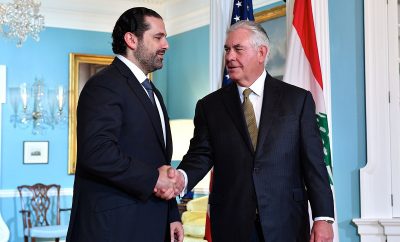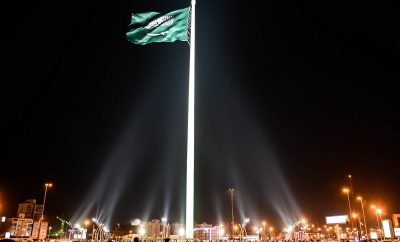 Image courtesy of [The Islamic State via Wikipedia]
Image courtesy of [The Islamic State via Wikipedia]
World
Crisis Hits Iraq: The Rise of ISIS
Iraq, the country America spent over eight and a half years nation building, is in a state of chaos, and a group called ISIS is responsible. Here’s everything you need to know about the sources of conflict in Iraq, who is to blame, and what America can do about it.
What is ISIS?
ISIS stands for Islamic State In Syria, and is also known as the Islamic State In Iraq and Levant. It is a Jihadist militant group that lays claim to land in Syria and is rapidly gaining territory in Iraq. Their stated goal is to create an Caliphate (Islamic state) ruled by a caliph (successor to Muhammad) that includes large regions of Syria and Iraq.
The group has taken advantage of the chaos of the countries they operate in to become one of the most powerful and well-financed militant organizations in the world.
ISIS used to be Al Qaeda’s branch in Syria and Iraq, but Al Qaeda disavowed the group this past February after months of feuding.
They are now fighting with the Iraqi government for control over many key cities.
What is ISIS’s problem with the current Iraqi government?
Nouri al-Maliki, the Prime Minister of Iraq, is a member of the Shia branch of Islam. He has been accused by his critics of exacerbating tensions between Shiites, Sunnis, and Kurds by appointing hardline Shiites to government positions.
What’s the difference between Sunnis and Shiites?
Sunni and Shia are two separate branches of the Islamic faith. After the Prophet Muhammad died in the year 632, Sunnis believed that the next leader of the Islamic world should be decided based on merit, whereas Shiites believed that the next leader of the Islamic world should be a descendant of Muhammad. The two branches split and there has been tension as well as bloodshed between the two ever since.
This is a very simple explanation of the divide. A whole article would be necessary to accurately explain why these two groups are still causing so much violence in the world today.
Iraq is home to three major ethnic groups: the Sunnis, the Shiites, and the Kurds. None of these groups like each other, and that tension has been the cause of sectarian violence ever since the United States invaded in 2003.
Who is winning?
ISIS, by a long shot.
They have complete control over Mosul, the second largest city in Iraq, and ISIS is already fighting over Baghdad, the nation’s capital.
Iraqi soldiers have been dropping their weapons and fleeing from ISIS, and the ones who have not run away have been brutally executed (WARNING: Graphic images).
What impact is this having on the region?
This is pretty much the worst case scenario for a post-U.S. invasion Iraq. The Iraqi government is collapsing quickly. Iraqis have lost confidence in their government and have joined militias to protect themselves. A top Shiite cleric has called upon all Iraqi Shiites to take up arms and repel the Sunni militants. This combination of a power vacuum and ethnic tension has all of the makings of a major ethnic conflict and, if ISIS is that powerful and brutal, a genocide.
Ethnic violence has reached the point of a humanitarian crisis. On June 15, ISIS claimed to have executed 1,700 Iraqi soldiers and posted gruesome photos to their social media profiles. Government forces shot 44 Sunni prisoners in their cells on June 16. That same day, a suicide bombing killed 16 Shiites.
The fact that Saudi Arabia is known to back ISIS has created even further tension throughout the region. Saudi Arabia and Iran hate each other, and a Sunni militant organization taking so much land near the Shia Iranian border does not make the Iranian government feel safe. Things are so upside down that Iran, who often refers to America as the “Great Satan,” has spoken with American diplomats about working together to stabilize the crisis.
This tweet from Iranian President Hassan Rouhani seems to say that Iran will not wait if the United States does not respond. Iran is ready to “protect” holy Shiite sites in Iraq, most likely with force.
Iranian nation will protect #Iraq's holy shrines & they aren't alone. Iraq's Sunnis, Shias & Kurds all ready to defeat terrorism #solidarity
— Hassan Rouhani (@HassanRouhani) June 18, 2014
Meanwhile, the Kurdish population in the Northern regions of Iraq have taken advantage of the chaos by strengthening their hold over their land. While this region has always been somewhat autonomous, Kurds believe they have a real chance to take this land away from Iraq entirely and claim it for themselves. Of course, there are disputes over which lands are Kurdish, which are Sunni, and which are Shiite, so this independence will not take place peacefully. Kurds have already started a militia called the Peshmerga to claim and protect these territories. Here is a Vice News report about the Peshmerga, ISIS, and their respective strategies:
The impact on Iraq’s oil exports could send shockwaves through the global economy. While most of the ports in Iraq are safe in the Southern region of the nation, there have already been clashes over the nation’s largest refinery. An oil conflict in OPEC’s second largest exporter could have a major impact on the market as a whole.
Who is to blame for this mess?
It’s Britain and France’s Fault
At this point you are probably asking yourself, “what idiot drew the borders of Iraq to include three ethnic groups that despise each other to the point of taking up arms?” The answer to that question lies in your high school history curriculum, all the way back to World War I. In 1916, both Britain and France signed the Sykes-Picot Agreement, which split the Ottoman Empire between the two powers after they won the war. This map ignored tribal lines and instead drew borders that would benefit the imperial powers.
There is no footage of this agreement being drawn out, but The Daily Show gives us a pretty good idea of how it probably went down.
The Daily Show
Get More: Daily Show Full Episodes,Indecision Political Humor,The Daily Show on Facebook
These borders have stayed roughly the same, until now. ISIS is ripping apart the Sykes-Picot map in favor of their own borders. The problem is that Sunnis and Shiites do not live in different parts of Iraq. They are a heterogeneous population. If ISIS wants a Sunni-only population, they will have to kill or force the migration of a lot of people.
It’s Obama’s Fault
President Obama withdrew all U.S. troops from Iraq in 2011 after a war that had lasted almost nine years. Despite multiple debates with Maliki, Obama was unable to secure a deal that would leave a small number of troops in Iraq that would help keep order and train the military. It is this lack of any residual forces that the Republican party is blaming for the current unrest. In their eyes, Iraq was in a good spot before the United States withdrew. Crime was down, elections were taking place, and insurgents were effectively counterbalanced by U.S. forces.
Obama made the political choice to withdraw from Iraq without thinking about the consequences or planning for an Iraq in a post-war environment.
Obama’s decision to stay out of Syria has also been criticized, as this allowed groups like ISIS to form in the jihadist hotbed.
The GOP has been hammering Obama on Sunday talk shows and in newspaper columns over this mess. Even former Bush Administration officials, most notably Vice President Dick Cheney, have piled on in the past week.
It’s Bush’s Fault
Democrats, on the other hand, believe that Bush Administration officials have some serious nerve blaming Obama for a problem they created. These are the same people that got us into Iraq (under false pretenses) in the first place. They removed Saddam Hussein from power, destabilized the country, and spent almost nine years, billions of dollars, and thousands of American lives trying to hold the place together.
Liberals have been heavily critical of those who they believe were wrong about Iraq in the first place. This quote from a Paul Waldman column in the Washington Post is particularly strong:
They’re the ones who swore that Saddam was in cahoots with Al Qaeda, that he had a terrifying arsenal of weapons of mass destruction, that the war would be quick, easy and cheap, that since Iraq was a largely secular country we wouldn’t have to worry about sectarian conflict, and that democracy would spread throughout the region in short order, bringing peace and prosperity along with it.
Bush, much like the British and French of the World War I era, ignored centuries of ethnic conflict in the Middle East, opened a huge power vacuum, and assumed that Sunnis, Shiites, and Kurds would just work it out peacefully.
From a liberal point of view, Cheney giving fault to Obama for the current crisis in Iraq is blame avoidance at its worst.
It’s Maliki’s Fault
Observers of Iraq argue that this is not the fault of Obama or Bush, but a political failure on the part of Maliki. During his tenure as Prime Minister he has stifled Sunni protests, refused economic concessions to Kurdish regions, and generally ignored a large plurality of the population. ISIS is gaining influence not because of their radical Islamist views but because they provide an opposition to Maliki that is powerful. Those who are fighting are not necessarily joining ISIS but are merely battling alongside them against a common enemy. Obama and Iran have been trying to get Maliki to start discussions with Sunni and Kurdish leaders, but it might be too little, too late. There is no good will between himself and Sunnis for Maliki to use as a way to get anyone to the table. A moderator of any diplomatic settlement would have to be an outsider, and a precondition to talks would most likely be Maliki’s resignation.
What can the United States do?
The United States has already sent 275 troops back to Iraq, but they are only there to protect the U.S. Embassy. They will not be fighting for the Iraqi government.
However, there are ways that Obama could assist Maliki in repelling this militant invasion. The New York Times is reporting that he is considering selective airstrikes on the militant groups using drones.
Beyond that, few people have any concrete ideas about what the United States should be doing to solve the crisis. Some in Congress are arguing that the United States should do “something,” but will not specify what that “something” is.
Retired Marines Lt. Col. Oliver North seems to be one of the few people arguing for sending troops to Iraq to fight ISIS.
Should the United States do anything?
If you ask the American people, the answer is no. According to a recent survey conducted by Public Policy Polling, 74 percent of Americans oppose sending troops to Iraq. 46 percent of Americans in a Rasmussen poll support air strikes, but that is still not a large mandate.
Lawmakers are unsure about whether or not they support any military action in Iraq. Congressmen who supported the war 12 years ago are suddenly unsure about even using air strikes.
These signs point to a public and a government that is wary of war in the Middle East. The wounds of the Iraq War are too fresh to reopen.
“After a decade of war, we’ve all had enough,” said Majority Leader Harry Reid (D-NV).
The last time Obama considered military action that the public opposed and Congress was unsure of was in Syria. He ended up not bombing Assad’s regime.
An airstrike would give Obama one benefit: If it succeeded, and helped Maliki conduct a successful counterattack, it would give him the leverage he needs to negotiate a peace deal and make his government more inclusive.
However, without spotters on the ground, it is difficult to accurately strike the right target and not strike any civilians. Effective air strikes would require at least some troops in Iraq.
As General Martin Dempsey, chairman of the Joint Chiefs of Staff, put it at a recent Senate panel, “it’s not as easy as looking at an iPhone video of a convoy and then striking it […]These forces are very intermingled.”
Conclusion
Iraq is falling, and there is not much that the United States can do about it. Centuries of sectarian conflict, a decade of U.S. occupancy, and incompetent Iraqi leadership have all led to this moment. ISIS is on the verge of tearing apart the Sykes-Picot borders and establishing a caliphate in the Middle East. The inevitably bloody upcoming civil war between Sunnis, Shiites, and Kurds might bring about the end of Iraq as we know it.
Update: On June 19, Obama announced that 300 military advisers would be sent to Iraq. Obama will also provide Iraq with counterterrorism equipment and two joint operations centers to give Iraqi forces the intelligence they need to fight ISIS. However, in the same announcement, Obama made two things clear: these military advisors will not engage in direct combat and that United States will not provide support to one Islamic sect at the expense of another. He still insisted that ground troops would not be sent to the conflict.
American combat troops are not going to be fighting in Iraq again,” Obama said. “We do not have the ability to simply solve this problem by sending in thousands of troops and committing the kind of blood and treasure that has already been expended.
Obama also mentioned that other military options were still on the table, and pressured Maliki to create a new, more inclusive government.
Resources
Primary
Yale Law SchoolThe Sykes-Picot Agreement
Additional
BBC: Profile: Islamic State In Iraq and Levant
Merced Sun-Star: Congress lacks consensus on Iraq
The New York Times: US and Iran signaling new joint effort in Iraq Crisis
The New York TImes: Obama considering selective airstrikes
The New York Times: Massacre claim shakes Iraq
News 4: Oliver North: Boots on the ground only viable option
Hill: American troops in Iraq might be inevitable
CBS News: GOP: Iraq disintegrating because of Obama’s withdrawal
Foreign Policy: Who lost Iraq?
Atlantic: Let’s not ignore those who got Iraq wrong
Reuters: Timeline of the Iraq War
LA Times: Kurds see historic opportunity in Northern Iraq
Foreign Policy: How does ISIS fund their operations?
Foreign Policy: Three major worries about Iraq
Mediaite: Is Iraq more or less stable without Hussein?








Comments